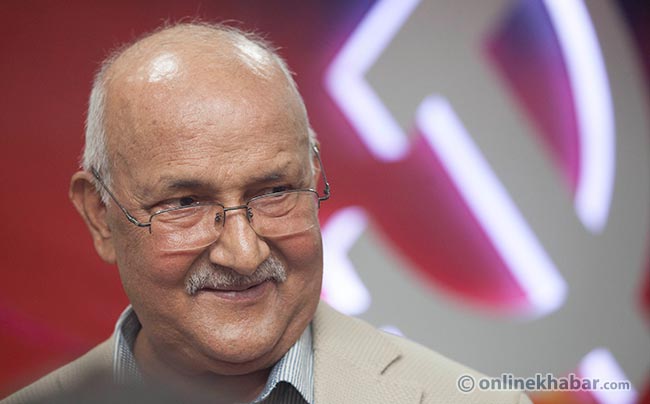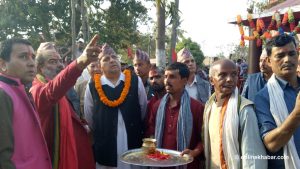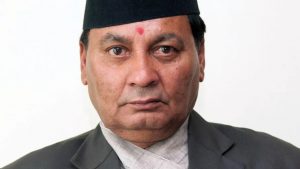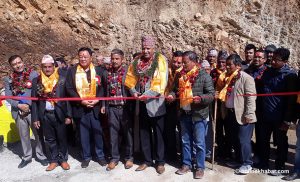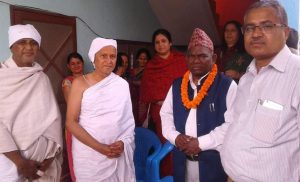Matrika Poudel/Analysis
Kathmandu, October 4 . Despite an understanding to select a prime minister on the basis of consensus by October 9, translating it into action will be impossible. For a consensus government to take shape, all 598 lawmakers will have to come on board, which will not be possible.
With Madheshi parties taking part in a movement and RPP-Nepal eyeing to be the main opposition, forming a consensus government will not be possible. Practically, it may be possible to form a majority government if the Nepali Congress, the CPN-UML and the UCPN-Maoist agree on such a dispensation. Small parties will support such an administration.
With President calling for government formation, the process for the election of prime minister has begun.
Ungentlemanly conduct in gentleman’s deal
While installing Sushil Koirala as the prime minister about 1.5 years ago, the Nepali Congress and the CPN-UML had reached an understanding to let the UML lead the government to be formed after the promulgation of the constitution. UML and UCPN-Maoist leaders say they had reached a gentleman’s agreement to let UML Chair KP Sharma Oli head the new government while signing the 16-point agreement.
However, after the call for the formation of a new government, Congress leaders have begun saying that there was no such understanding to let UML or Oli take leadership of a new government. Congress Vice-President Ram Chandra Poudel told Online Khabar: “Don’t put me into difficulty by asking about this. I am not aware of any understanding to hand over the PM’s post to any individual.”
Poudel’s remark comes at a time when President has called for formation of a new government, Sushil Koirala has paved the way for change of guard and Oli is ready for the change of guard.
At a time when domestic and foreign forces are obstructing the implementation of the new constitution, the three major forces have no option but to come together. But how do they do that at a time when the PM’s post is becoming a divisive issue?
UCPN-Maoist: The PM-maker
The Congress has not yet made a formal decision on whether or not to let the UML head the new dispensation. But the UML is clear on one thing: It will not join the future government if it does not get the PM’s post. Does this mean either the Congress or the UML will have to stay in the opposition? UML Deputy Secretary General Bishnu Poudel says, “We do not want to run the new government by keeping the Nepali Congress out of it. But we will not join the government if our party does not get the opportunity to lead it.”
At a difficult situation like this, the UCPN-Maoist can emerge as the ‘kingmaker’. Whichever party gets the Maoist support gets to head the new government.
Maoist Chairperson Prachanda has already talked about the understanding to make Oli the next PM. Talking to reporters, Maoist Chief Whip Giriraj Mani Pokhrel also talked about a gentleman’s agreement on letting the UML lead the next government.
But Congress leaders keep mum on the gentleman’s agreement. Says UML leader Poudel: “Congress leaders should check why did Sushil Koirala not inform Ram Chandra Poudel about the agreement. Was it Koirala’s weakness or a deliberate ploy?”
Majority process uncertain
Even after President’s call for new government, it’s clear that the country will not get a new government within a week. The president can extend the deadline for government formation by a few days. Ultimately, though, there’s no alternative to selecting the PM on the basis of a majority in the House. Even after going for a majority vote, the major parties should select a common candidate for the top post, Congress leader Ananda Dhungana says.
There’s no alternative for the three parties to cobble together a new government. But who should lead the dispensation? Government leadership is proving to be a thorny issue.
Congress in four directions
Congress has not staked claim for the top post formally. A lobby within the party wants Sushil Koirala to continue as the PM. Those loyal to leader Sher Bahadur Deuba are lobbying in the international fora in their bid to make Deuba the chief executive.
Bal Krishna Khand, a leader close to Deuba, says Congress will continue to have legitimate claim on the government leadership unless Sushil Koirala or any other Congress leader continues informs the Congress working committee about the ‘gentleman’s deal’ to hand over government leadership to the UML. Asked who is staking the claim for the top post from the Congress party, Khand told Online Khabar, “Sushil Dai himself said he will quit as PM after promulgation of the constitution. Party activists and the evolving situation calls for a government under Sher Bahadur Deuba’s leadership.”
The Deuba camp does not want Sushil Koirala to retain the top post, neither does it want Ram Chandra Poudel to become the PM. It will be no wonder if Deuba supports KP Oli for the top post. Khand says Deuba may be capable of moving ahead by taking those involved in the Madhesh movement, the UML and the UCPN-Maoist into confidence. “This does not mean rejecting Oli outright. In the first place, the leaders should inform us about the gentleman’s deal.”
NC leaders like Krishna Sitaula and Purna Bahadur Khadka are in favour of keeping the promise. They maintain that the party should not cheat the UML. And they are trying to convince Deuba on this. “Conspiracies are afoot to weaken the constitution by creating rifts between the three political parties,” Congress lawmaker Ram Hari Khatiwada said. Sitaula and Purna Bahadur Khadka are worried about this, he said, stressing that Oli should be made the PM if he had indeed been assured of the top post.
UML: PM or opposition
Notably, UML leaders are on one page, whether it’s on constitution-making or on taking government leadership. Senior leader Jhala Nath Khanal said, “The UML will lead the new government. Comrade KP Oli will become the consensus prime minister.” Leaders close to Khanal and another senior leader Madhav Nepal have been saying that no other UML leader, save Oli, has staked claim for the PM’s post. “Comrade KP Oli should head the consensus government. There’s no dispute in the UML on this issue,” UML politburo member Prakash Jwala, who is considered close to leader Nepal, said.
Delegates fail to impress Madhav Nepal
Some Congress leaders had met UML leader Madhav Nepal, pointing that India will not accept Oli, while UDMF is also angry with him. They said things will be easy if the UML selects Nepal himself, and not Oli, for the top post, according to a source. But Nepal rejected the proposal, warning them not to play politics within the UML, leaders close to Nepal said. No one else will stake claim on the top post from the UML unless Oli himself proposes another name from the party for the top post.
Amendment impossible sans UML
It’s pretty clear that the UML will not join the government if Oli does not get the PM post. In such a scenario, it will be difficult to amend the constitution. For garnering a two-third majority for such an amendment, Congress, UML and the UCPN-Maoist (or Madheshi parties in place of the Maoist party) will have to come together.
For addressing agendas of the Madheshi movement, the constitution will have to be amended. The UML will not vote for amendment unless it does not get the government leadership.
India, Madhesh cards against Oli
UML leaders say certain quarters have started showing India and Madhesh cards against Oli after the process of forming a new government began. The Indian establishment is said to be angry with Oli because he has turned down an invite to visit Delhi, turned down the request to stop constitution promulgation and has resorted to tough posturing on Madhesh’s demands. Sher Dhan Rai, a leader close to Oli, says Oli wants to become prime minister with support from the Nepali people, not Delhi.
Old guard till Dashain?
The process of electing prime minister with a majority vote will begin if both the Congress and the UML continue to stake claim on the government leadership. Currently, there are 598 lawmakers in the Parliament. Whoever garners half of these votes will become the prime minister. It is easier for the Congress to get a majority in the Parliament. For this, the UCPN-Maoist, RPP lawmakers and lawmakers from Madheshi parties will have to vote for the Congress. Leaders do not have courage at the moment to stoop that low. With the country brought to a grinding halt with the promulgation of the constitution, it will not be in the interest of the parties involved in constitution promulgation to break their unity on the crucial issue of government formation.
Consensus-building and majority-garnering processes may last really long, and a new government may not materialise before Dashain. The parties have responsibility to normalize life by pacifying the Madhesh movement and ending the Indian blockade.


